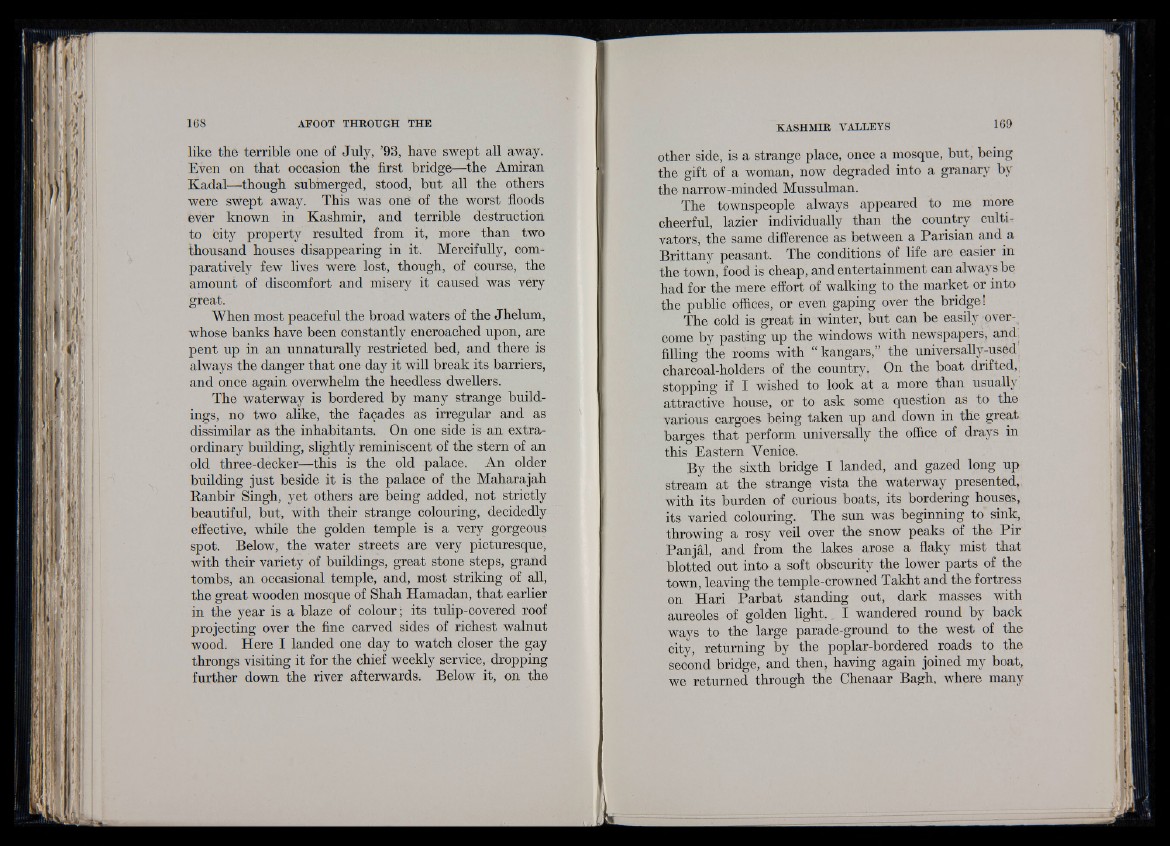
like the terrible one of July, ’93, have swept all away.
Even on that occasion the first bridge—the Amiran
Kadal—though submerged, stood, but all the others
were swept away. This was one of the worst floods
ever known in Kashmir, and terrible destruction
to city property resulted from it, more than two
thousand houses disappearing in it. Mercifully, comparatively
few lives were lost, though, of course, the
amount of discomfort and misery it caused was very
great.W
hen most peaceful the broad waters of the Jhelum,
whose banks have been constantly encroached upon, are
pent up in an unnaturally restricted bed, and there is
always the danger that one day it will break its barriers,
and once again overwhelm the heedless dwellers.
The waterway is bordered by many strange buildings,
no two alike, the façades as irregular and as
dissimilar as the inhabitants. On one side is an extraordinary
building, slightly reminiscent of the stern of an
old three-decker—this is the old palace. An older
building just beside it is the palace of the Maharajah
Ranbir Singh, yet others are being added, not strictly
beautiful, but, with their strange colouring, decidedly
effective, while the golden temple is a very gorgeous
spot. Below, the water streets are very picturesque,
with their variety of buildings, great stone steps, grand
tombs, an occasional temple, and, most striking of all,
the great wooden mosque of Shah Hamadan, that earlier
in the year is a blaze of colour; its tulip-covered roof
projecting over the fine carved sides of richest walnut
wood. Here I landed one day to watch closer the gay
throngs v isit in g it for the chief weekly service, dropping
further down the river afterwards. Below it, on the
other side, is a strange place, once a mosque, but, being
the gift of a woman, now degraded into a granary by
the narrow-minded Mussulman.
The townspeople always appeared to me more
cheerful, lazier individually than the country cultivators,
the same difference as between a Parisian and a
Brittany peasant. The conditions of life are easier in
the town, food is cheap, and entertainment can always be
had for the mere effort of walking to the market or into
the public offices, or even gaping over the bridge!
The cold is great in winter, but can be easily overcome
by pasting up the windows with newspapers, and
filling the rooms with “ kangars,” the universally-used;
charcoal-holders of the country. On the boat drifted,,
stopping if I wished to look at a more than usually
attractive house, or to ask some question as to the
various cargoes being taken up and down in the great
barges that perform universally the office of drays in
this Eastern Venice.
By the sixth bridge I landed, and gazed long up
stream at the strange vista the waterway presented,
with its burden of curious boats, its bordering houses,
its varied colouring. The sun was beginning to sink,
throwing a rosy veil over the snow peaks of the Pir
Panjal, and from the lakes arose a flaky mist that
blotted out into a soft obscurity the lower parts of the
town, leaving the temple-crowned Takht and the fortress
on Hari Parbat standing out, dark masses with
aureoles of golden light. I wandered round by back
ways to the large parade-ground to the west of the
city, returning by the poplar-bordered roads to the
second bridge, and then, having again joined my boat,
we returned through the Chenaar Bagh, where many